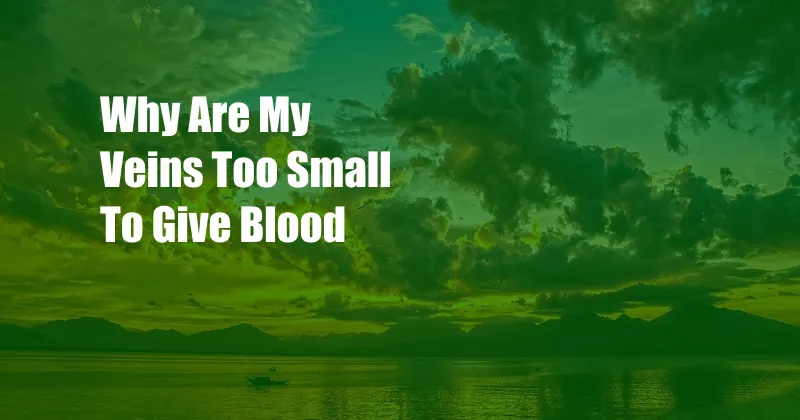
Why Are My Veins Too Small to Give Blood?
As someone who is eager to contribute to the noble cause of blood donation, I was surprised and disheartened when I was informed that my veins were too small to proceed. Curious, I embarked on a journey to understand the reason behind this setback, and I would like to share my insights with you in this comprehensive guide.
It may come as a surprise, but the size of our veins plays a significant role in our ability to donate blood. Certain factors, such as age, weight, and genetics, can contribute to the size of our veins. While genetics and age are factors that we cannot control, weight is something that we can influence through healthy lifestyle choices.
The Significance of Vein Size in Blood Donation
Before we delve into the reasons behind small veins, let’s first understand why vein size is important for blood donation. The process of blood donation involves extracting a significant amount of blood from the donor’s body within a relatively short time frame. Adequate vein size ensures that the blood can be drawn efficiently and without causing undue discomfort to the donor.
Small veins pose several challenges during blood donation. Firstly, it becomes difficult for the phlebotomist to locate and access the vein, which can prolong the procedure and cause discomfort. Secondly, small veins may not be able to accommodate the required flow rate of blood, leading to a slower and potentially unsuccessful donation.
Causes of Small Veins
The size of our veins is primarily influenced by two factors: genetics and body composition. Genetics plays a crucial role in determining the diameter and elasticity of our veins, which can vary significantly from person to person. Body composition, especially weight, also impacts vein size. Individuals with a higher body mass index (BMI) tend to have larger veins, as they require a greater blood supply to support their increased tissue mass.
Other factors, such as dehydration and certain medications, can also temporarily affect vein size. Dehydration can cause veins to constrict, making them harder to locate and access. Some medications, such as diuretics, can also lead to dehydration and contribute to smaller vein size.
Addressing Small Veins: Tips and Expert Advice
While we cannot alter our genetics, there are certain steps we can take to improve our chances of successful blood donation despite having small veins. Here are some tips and expert advice to help you prepare for your next blood donation:
- Hydrate well: Drink plenty of fluids, especially water, in the hours leading up to your blood donation. This will help your veins expand and become more visible.
- Avoid caffeine and alcohol: These substances can cause dehydration and make your veins harder to find.
- Choose a time when you are relaxed: Stress can lead to vein constriction, so try to schedule your donation during a time when you are feeling calm and relaxed.
- Inform the phlebotomist: Let the phlebotomist know that you have small veins so that they can take the necessary precautions and use a smaller needle.
- Consider donating platelets: Platelet donation requires a smaller volume of blood and may be a more suitable option for individuals with small veins.
FAQ on Small Veins and Blood Donation
To provide further clarification on this topic, here are answers to some frequently asked questions:
- Q: Can small veins become larger over time?
A: Unfortunately, the size of our veins is primarily determined by genetics and cannot be significantly enlarged over time.
- Q: Are there any exercises that can help enlarge veins?
A: There is no scientific evidence to support that exercises can increase vein size.
- Q: Can I still donate blood if I have small veins?
A: Yes, it is possible to donate blood even with small veins. However, it may be necessary to use a smaller needle or donate platelets instead.
- Q: Should I avoid donating blood if I have small veins?
A: No, you should not avoid donating blood simply because you have small veins. Talk to your doctor or the blood bank staff to discuss your options.
Conclusion
While vein size plays an important role in blood donation, it should not deter individuals who want to contribute to this life-saving cause. By understanding the reasons behind small veins and following the tips and advice outlined in this article, you can increase your chances of successful blood donation.
I encourage you to consider donating blood, regardless of your vein size. Every drop of blood you give can make a profound difference in someone’s life.
Call to Action:
Have you ever been turned away from blood donation because of small veins? Share your experience in the comments below and let’s discuss how we can overcome this challenge together.